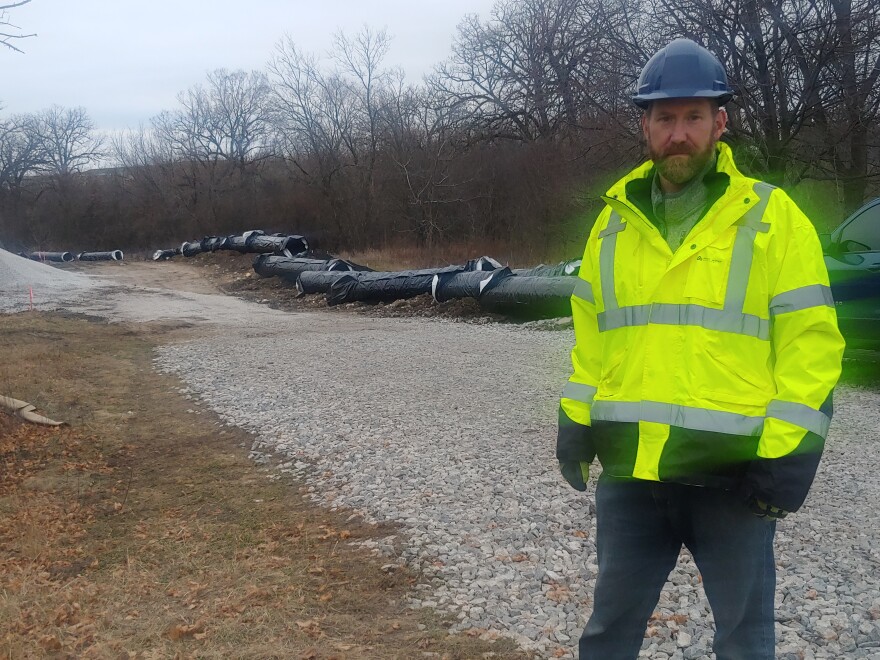Construction has started on the two pipelines that will carry Lake Michigan drinking water from Milwaukee to Waukesha and treated wastewater back towards the lake. It's expected to take almost three years to finish the diversion project aimed at providing Waukesha with a reliable source of clean water. But along the way, there could be challenges with communication, cost and political cooperation.
Long black pipes and gravel to be used as fill are already on top of the ground outside the wastewater treatment plant in Waukesha.

The 30-inch diameter steel pipes are wrapped in two layers of plastic. Chris Walter of the Waukesha Water Utility says the plastic and other coating on the pipe will reduce corrosion once it goes underground, to reduce, he says, “any kind of vulnerability from different materials — whether it's the soil or different lines above it, in the ground next to it."
"This pipe, it's designed for a life of 100 years, and hopefully beyond that. We're definitely taking all the measures we can to make sure this pipe is extremely sustainable,” Walter tells WUWM.
Eventually, 23 miles of this return flow pipe will carry treated wastewater through Waukesha, New Berlin and Muskego to a discharge area in Franklin next to the Root River, which flows into Lake Michigan in Racine.
Crews are also getting ready to begin laying 13 miles of pipe to carry drinking water from roughly S. 76 St. and W. Oklahoma Ave. in Milwaukee, through West Allis, Greenfield, and New Berlin to Waukesha.
Monday, officials from Milwaukee and Waukesha held a ceremonial groundbreaking for a new water pumping station that will be built near the 76th St. intersection.

Waukesha Mayor Shawn Reilly said by September 2023, his city will put behind it decades of uncertainty about its underground water supply.
"Waukesha will no longer have to worry about confined aquifers, increasing groundwater temperature, dissolved minerals, salt contamination, drawdowns of our groundwater, and radium contamination,” Reilly said.

But that assumes construction of the pipelines goes smoothly. Waukesha has already had to work out a disagreement with New Berlin over the location of another pumping station. Waukesha Water Utility General Manager Dan Duchniak says another challenge will be to keep all the communities along the routes up to date.
"Water utilities are in the business of putting pipe in the ground. That toss is the easy part. There's the coordination of going through eight different municipalities and making sure you keep everybody informed. Once we get the facilities built, it's going to be the transition to the new supply. We want to make sure we can transition without and issues or water quality issues,” Duchniak tells WUWM.

Duchniak says there's also some uncertainty as to how much Waukesha ratepayers will have to pay for the project. He says the water-only portion of their bill will likely double, and maybe triple.
Cheryl Nenn, of Milwaukee Riverkeeper and the Compact Implementation Coalition, which challenged parts of the diversion project, says ratepayers deserve to know that figure soon.
"These are not cheap projects and it's important that folks are going into this with eyes wide open about the full cost of getting Great Lakes diversion. I think certainly, the other communities in the region that are maybe pondering a similar diversion are going to be looking really closely at all of that," she says.
Nenn says environmental groups will continue to monitor other aspects of the pipelines, and urge Great Lakes governors and Canadian officials, who approved the Waukesha diversion, to do the same.

In Milwaukee, some politicians say they'll be looking to make sure Waukesha lives up to other promises it made when the big city agreed to sell water to the west. Milwaukee Common Council President Cavalier Johnson said there should be more regional cooperation.
"I look forward to a future in which we don't just celebrate a great water alliance, but we celebrate a great transit alliance, a great housing alliance with other communities around Milwaukee and southeastern Wisconsin,” Johnson said at Monday’s news conference.
Milwaukee Mayor Tom Barrett said he anticipates more talks with Waukesha about those topics. Meanwhile, the mayor said he's looking forward to the Milwaukee Water Works eventually receiving millions of dollars a year in fees from Waukesha, if all goes according to plan with the diversion project now entering 33 months of construction.




